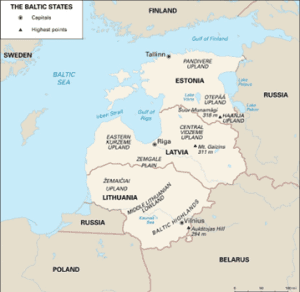TAG: GS 3: SCIENCE AND TECHNOLOGY
THE CONTEXT: Recent accusations by Estonia against Russia of jamming GPS navigation devices in airspace above the Baltic states have drawn attention to the growing problem of GPS interference.
EXPLANATION:
- This interference poses significant challenges for aviation safety and navigation, highlighting the need for comprehensive understanding and mitigation strategies.
Baltic States:
- The Baltic states or the Baltic countries is a geopolitical term encompassing Estonia, Latvia, and Lithuania.
- All three countries are members of NATO, the European Union, the Eurozone, and the Organisation for Economic Co-operation and Development (OECD).
- The three sovereign states on the eastern coast of the Baltic Sea are sometimes referred to as the “Baltic nations”, less often and in historical circumstances also as the “Baltic republics”, the “Baltic lands”, or simply the Baltics.

Baltic States
What is GPS Jamming and Spoofing?
- GPS, or Global Positioning System, is a vital navigation tool utilized in aviation, providing accurate positioning, navigation, and timing data.
- GPS is one of the more important navigation tools in aviation, which has replaced expensive ground devices that would transmit radio beams to guide planes towards landing.
- GPS jamming involves the deliberate disruption of GPS signals using frequency transmitting devices, which emit signals stronger than satellite-based signals, thereby interfering with radio communications.
- Spoofing, on the other hand, entails the transmission of false GPS signals to deceive receivers, leading to incorrect time or coordinates readings.
- While jamming disrupts signals, spoofing can potentially mislead pilots and air traffic control systems, posing greater risks to aviation safety.
Occurrence and Regional Impact
- Instances of GPS interference have been reported globally, particularly in conflict zones and regions near war zones.
- In the Middle East, for example, spoofing incidents have affected private and commercial jets around Iraq, Iran, Israel, and the Black Sea.
- The Baltic countries have also experienced increased jamming activities, especially since the conflict in Ukraine began in 2022.
- The surge in interference around the Baltic Sea has raised concerns among aviation authorities and pilots, necessitating enhanced awareness and response measures.
Challenges for Airlines and Aviation Safety
- GPS interference presents significant challenges for airlines, as modern airliners heavily rely on GPS for navigation.
- While alternative sensors and navigation sources exist, GPS remains a primary tool for flight operations. Interference can lead to stress and delays during take-off and landing, as certain procedures require GPS functionality.
- Additionally, private jets that rely solely on GPS navigation may face heightened risks in the event of interference.
- Despite efforts to develop technological solutions, the diverse nature of jamming and spoofing devices complicates mitigation efforts, prompting a focus on pilot training to identify and respond to interference promptly.
GPS:
- GPS, or the Global Positioning System, is a satellite-based radio navigation system that provides location, velocity, and time data to users with GPS receivers.
- Here are the key points about how GPS works:
- GPS uses a constellation of 24 satellites orbiting the Earth at an altitude of about 20,000 km.
- Each satellite continuously broadcasts its position and the time according to its onboard atomic clock.
- A GPS receiver on the ground measures the time it takes for the signals from multiple GPS satellites to reach it. By calculating the distance to at least four satellites using this time delay, the receiver can determine its three-dimensional position (latitude, longitude, and altitude) through a process called trilateration.
- The accuracy of unaugmented civilian GPS is typically around 10 meters horizontally and 15 meters vertically.
- More precise GPS applications, such as those used by the military or with additional ground-based augmentation systems, can achieve accuracies of 1 meter or less.
- GPS has a wide range of applications, including navigation, surveying, scientific research, recreation, and more.
- Ongoing improvements to GPS, such as the launch of more advanced GPS III satellites, are expected to further enhance the system’s accuracy, reliability, and capabilities in the future.




